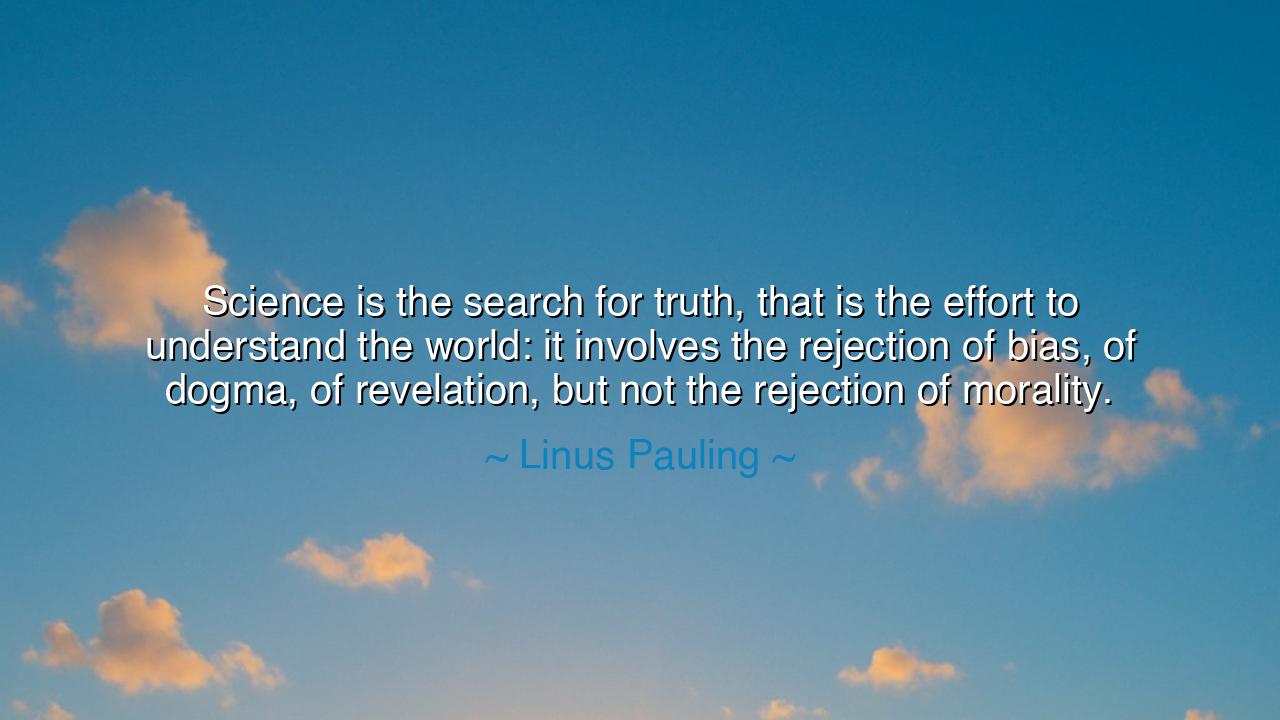
Science is the search for truth, that is the effort to understand
Science is the search for truth, that is the effort to understand the world: it involves the rejection of bias, of dogma, of revelation, but not the rejection of morality.






“Science is the search for truth, that is the effort to understand the world: it involves the rejection of bias, of dogma, of revelation, but not the rejection of morality.” Thus spoke Linus Pauling, a man who stood among the greatest of the twentieth century, a master of chemistry and a voice for peace, honored with two Nobel Prizes. His words rise like a beacon, for they remind us that science, though it is a discipline of reason, is also a discipline of virtue. It seeks truth—not opinion, not tradition, not blind command—but truth tested by evidence. Yet even as it casts aside bias and dogma, it must never cast aside the guiding light of morality.
The origin of these words is born from Pauling’s life itself. As a scientist, he uncovered the very architecture of molecules, peering into the unseen structures of the world. Yet he also witnessed how that same knowledge was used to create weapons of mass destruction, to scorch cities with atomic fire. He knew the temptation to see science as cold, as detached, as nothing but numbers and results. But Pauling stood against that view. To him, science was not the enemy of ethics—it was the ally of it, for what use is truth if it serves only cruelty? What value is understanding if it brings only ruin? Thus he declared that the scientist must reject not only falsehood, but also indifference to the moral consequences of discovery.
Consider the tale of the Manhattan Project, where brilliant men and women unlocked the power of the atom. They had achieved what once seemed impossible: the splitting of the nucleus, the harnessing of energy greater than fire itself. But when Hiroshima and Nagasaki burned, the world saw both the triumph and the terror of science unmoored from morality. Pauling, who had studied these same forces, dedicated much of his later life to the cause of disarmament, warning humanity that the search for truth must never be divorced from the search for justice. His words are the distillation of that lesson: reject bias and dogma, yes—but cling fast to morality.
The ancients, too, whispered this wisdom. Plato warned that knowledge without virtue is dangerous, that cleverness without justice corrupts the soul. Confucius taught that wisdom must be bound by righteousness, or it becomes cunning rather than true insight. In every age, thinkers have known that the human mind can soar to great heights, but without the ballast of ethics, it can plunge into destruction. Pauling’s voice joins this timeless chorus: the mind must seek truth, but the heart must guide its use.
This quote also rebukes those who mistake science for faithless arrogance. To reject revelation is not to reject meaning; to reject dogma is not to embrace chaos. Rather, it is to say that truth must be tested, that knowledge must be earned through struggle and observation, not handed down as unquestioned decree. But alongside this, Pauling affirms that morality is not a superstition to be discarded—it is the compass by which the traveler of truth avoids becoming lost in the wilderness. Science without morality is blind; morality without truth is powerless. Together, they create wisdom.
And so, O listener, take this lesson into your life: in your own search for truth, cast aside prejudice, question authority, and do not accept easy answers. Examine, test, and think for yourself. But do not imagine that the pursuit of knowledge frees you from responsibility. Whatever truths you uncover—whether in your work, your words, or your deeds—ask always how they serve the good, how they uplift rather than destroy. For the worth of knowledge lies not only in its accuracy, but in its use for justice and compassion.
Practical is the path forward: when you study, study honestly; when you argue, argue fairly; when you act, act with conscience. Let your mind be clear of bias, your heart free of dogma, but your life anchored in morality. In this way, you will walk the path of true science—not only the science of the laboratory, but the science of living: the eternal search for truth joined with the eternal striving for good.






AAdministratorAdministrator
Welcome, honored guests. Please leave a comment, we will respond soon